december-top.html
1804 George Barrington died on this day in Australia in 1804. He was an Irish pickpocket, who had been sentenced to seven years’ hard labour in Botany Bay.
However, Barrington had avoided that fate when he gained favour with the captain of his transportation ship, by warning him of a planned uprising amongst his fellow convicts. The captain took precautions to prevent the uprising, and spoke favourably of Barrington when they arrived in Australia. This led to him being granted emancipation and he lived out the rest of his life a free man.
Barrington had been born in Maynooth in Leinster. He robbed from his own headmaster at school and ran away. He became an expert pickpocket, working mainly at Limerick race course.
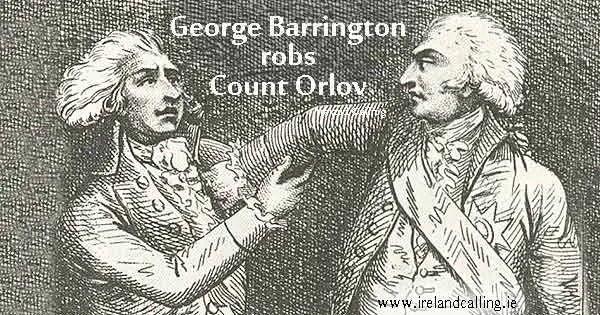
Eventually, his team was caught and he fled to London to avoid arrest. He continued his pickpocketing ways and stole from several members of the upper classes without ever being caught. Barrington dressed well and was a charming and articulate speaker. These skills enabled him to get into high class parties, where the pockets of the guests contained all sorts of riches.
On one occasion, Barrington is reported to have stolen a snuff box from the Russian nobleman Count Orlov, The box was worth about £30,000 but Barrington got away with it because the Count didn’t want to press charges.
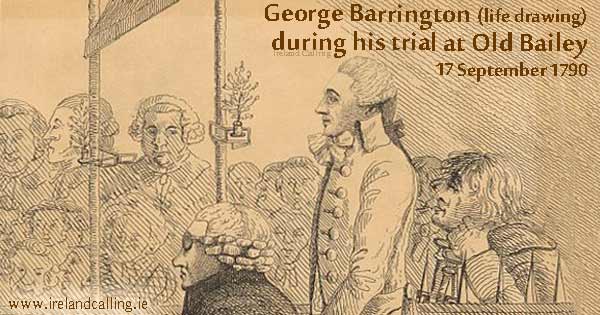
However, he was eventually caught sent him to a labour camp in Australia. Barrington managed to secure a life of comfort for himself though, when he gained favour with the ship’s captain.
* * *
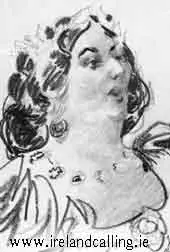 1821 Jane Wilde was born in Dublin on this day in 1821. She was a poet, and wrote under the pseudonym Speranza. Wilde was a lover of Irish myths and folklore, and often referenced them in her poems.
1821 Jane Wilde was born in Dublin on this day in 1821. She was a poet, and wrote under the pseudonym Speranza. Wilde was a lover of Irish myths and folklore, and often referenced them in her poems.
She was also a supporter of the Irish nationalist movement that took place throughout the 19th century, and often wrote pro-Irish and anti-British articles for The Nation newspaper.
Wilde was married to surgeon Sir William Wilde and they had three children together, one of whom was Oscar Wilde.
Click here to read about more Irish writers
Click here to read some of the best Oscar Wilde quotes
Click here to read some traditional Irish fairy stories and folk tales
Her most famous poem is, perhaps, The Famine Year (also known as The Stricken Land). Click to read the full poem
* * *
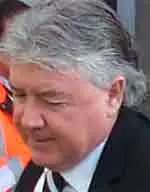 1946 Happy birthday to Joe Kinnear, born in Dublin on this day in 1946. His father died while he was still young and he moved to Watford, England as with his mother and siblings.
1946 Happy birthday to Joe Kinnear, born in Dublin on this day in 1946. His father died while he was still young and he moved to Watford, England as with his mother and siblings.
Kinnear grew up to become a professional footballer, playing almost his entire career at Tottenham Hotspur where he won the FA Cup, two League Cups and the UEFA Cup. He also played for the Republic of Ireland team 26 times.
Kinnear then went on to have a long and successful career as a manager at Wimbledon, Newcastle, Nottingham Forest and several other clubs.
Click here to read about more top Irish sports stars
* * *
1969 Dan Breen died on this day in 1969. He was a leading soldier for the Irish Republican Army during the War of Independence. Breen had a tough upbringing in Tipperary. His father died when he was a young boy, leaving the family to struggle to survive with little money.
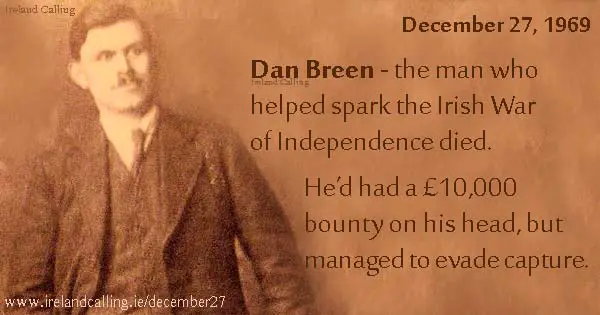
He grew up with a strong sense of Irish nationalism and resentment at the country’s treatment by the British. Breen joined the Irish Republican Army in and was involved in the incident that is considered to have started the War of Independence.
Breen and seven others attacked two Royal Irish Constabulary policemen who were moving explosives across Dublin. The policemen were killed. Breen later spoke about the group’s intentions that day:
“…we took the action deliberately, having thought over the matter and talked it over between us. Treacy had stated to me that the only way of starting a war was to kill someone, and we wanted to start a war, so we intended to kill some of the police whom we looked upon as the foremost and most important branch of the enemy forces … The only regret that we had following the ambush was that there were only two policemen in it, instead of the six we had expected…”
Breen was a wanted man after that attack. The British authorities placed a £10,000 bounty on his head, but he managed to evade capture. He was one of the leading soldiers of the IRA during the war, repeatedly being involved in gunfights and battles, including rescuing Séan Hogan from a guarded train after he had been captured by British forces.
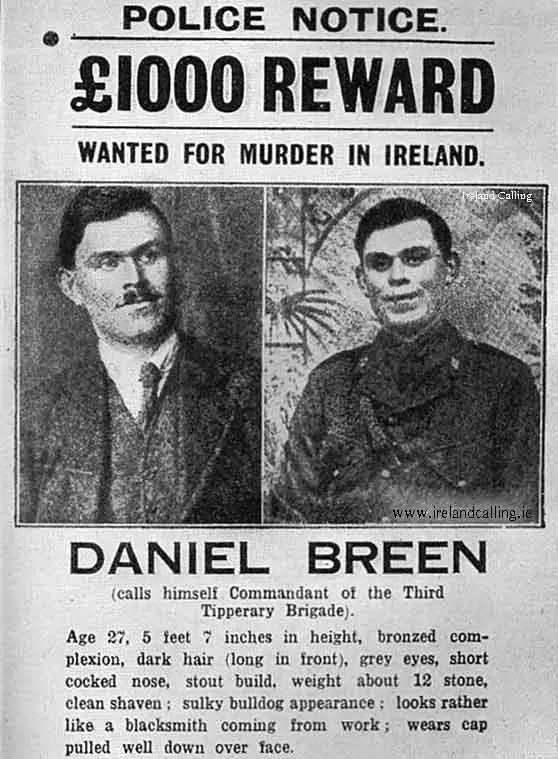
Breen married Brigid Malone in 1921, after she nursed him back to health following a gunshot wound.
He sided with the anti-Treaty IRA after the signing of the Anglo-Irish Treaty. In the Irish Civil War, Breen began fighting against his former comrades, but was arrested and imprisoned by Free State forces.
He then went in to politics, as the Fianna Fáil representative for Tipperary. Breen also wrote and published a book of his experiences in the War of Independence and Civil War, called My Fight for Irish Freedom. Breen remained a TD up until his retirement in 1965.
Click here to read about more key characters from Irish history
* * *
 1977 Happy birthday to Sinead Keenan, born in Dublin on this day in 1977. She is a well-known actress who will be recognisable to people in Ireland as Farrah Phelan from the popular soap Fair City. Keenan has also starred in the British supernatural series Being Human, in which she played a werewolf called Nina Pickering.
1977 Happy birthday to Sinead Keenan, born in Dublin on this day in 1977. She is a well-known actress who will be recognisable to people in Ireland as Farrah Phelan from the popular soap Fair City. Keenan has also starred in the British supernatural series Being Human, in which she played a werewolf called Nina Pickering.
Keenan has also had several other important roles throughout her career. She has performed on stage in a theatre production of A Midsummer Night’s Dream, had a part in the BBC’s sci-fi drama Doctor Who and also appeared as a guest on Alan Carr’ Chatty Man.
Click here to read about more Irish actors
* * *
1997 Billy Wright was assassinated in Maize prison on this day in 1997. He was a leading member of the Ulster Volunteer Force throughout most of his life, a paramilitary group that spent many years fighting against the IRA in Northern Ireland.
Wright was killed in Maze prison in a meticulously co-ordinated attack carried out by members of INLA. The assassination was in retaliation to an LVF murder of GAA member Gerry Devlin. The LVF was a paramilitary group founded and ran by Wright after he had fallen out with senior figures in the UVF.
december-bottom.html